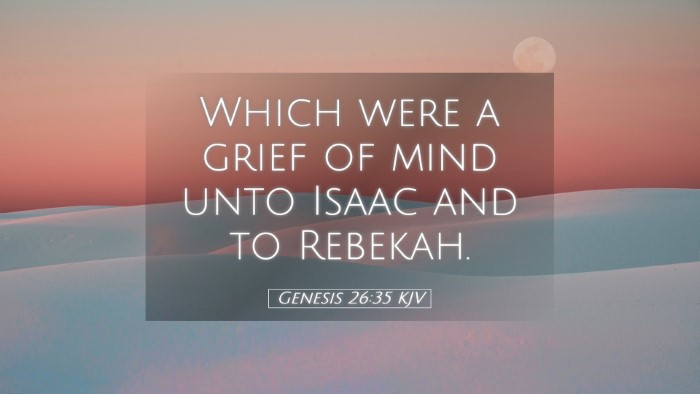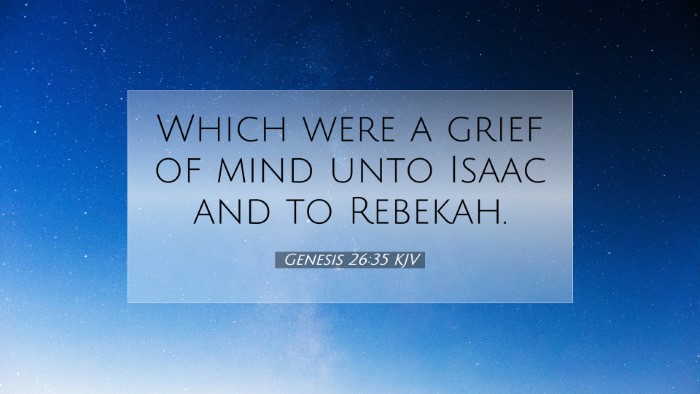Genesis 26:35 - Commentary
Genesis 26:35 states, "And they were a grief of mind unto Isaac and to Rebekah." This verse reflects the turmoil in the family of Isaac and Rebekah as they deal with the consequences of Esau's marriages. This commentary seeks to delve into the theological and practical implications of this verse through a synthesis of insights from notable public domain commentaries.
Contextual Analysis
In the broader context of Genesis 26, we observe Isaac's endeavors in Gerar and the subsequent challenges he faced, including the wells that were contested by the Philistines. It was during this period that Esau, Isaac’s eldest son, took wives from among the Hittites. The choice of these wives was a profound disappointment to Isaac and Rebekah, as it directly violated the covenantal principles of marrying within the faith.
Interpretative Insights
Matthew Henry's Commentary:
- Henry observes the heartache caused by Esau’s decisions, highlighting the importance of marital choices in biblical narratives.
- He emphasizes that the grief experienced by Isaac and Rebekah stemmed from their concern for the covenant and the future generations of their lineage. Marrying into pagan families not only endangered the faith but also the promises of God concerning the lineage of Abraham.
Albert Barnes' Notes on the Bible:
- Barnes elaborates on the cultural implications of Esau's choice, noting that it was not simply a personal matter but one that had broader spiritual ramifications.
- He stresses that this instance illustrates the conflict between the covenant community and those outside of it, emphasizing the call for believers to marry within the faith as a protective measure for spiritual integrity.
- Barnes also mentions that the term "grief of mind" indicates a deep emotional distress, elucidating the pain felt by Isaac and Rebekah without any bitterness or anger towards Esau himself; it was a sorrow rooted in love for their child.
Adam Clarke's Commentary:
- Clarke provides a socio-historical perspective, indicating that the Hittites were known for their idolatrous practices, which would have been in stark contrast to the faith of Isaac and Rebekah.
- He mentions that Esau’s action represented both a personal folly and a familial failure, reflecting larger themes of disobedience to God’s ordinances.
- Furthermore, Clarke posits that this event serves as a cautionary tale regarding the influences of society on personal decisions, urging readers to remain vigilant about their choices, especially in matters of relationships.
Theological Implications
This passage invites theological reflection on the nature of grief within God's design for family and marriage. The tensions arising between family members due to differing faith commitments serve as a reminder of the significance of covenant fidelity. This raises critical questions for contemporary believers regarding their approach to relationships, especially in a multicultural and pluralistic society.
Covenant and Relationships
The familial grief experienced by Isaac and Rebekah points to a crucial element of the covenantal community in the Old Testament: the expectation of maintaining a lineage that adheres to God's will. The emphasis on faithfulness not only underscores individual responsibility but also the collective identity of God's chosen people.
Personal Reflection and Application
For pastors and church leaders, this verse is a poignant reminder of the necessity for teaching on the importance of godly relationships. It opens avenues for discussing how marital decisions can have lasting effects on families and communities. Encouraging congregants to seek divine counsel in their relationship choices could mitigate the grief that arises when actions are taken outside of God's design.
Conclusion
Genesis 26:35 serves as a multifaceted reflection on the dynamics of family, faith, and the burden of choices made against God’s revealed will. The insights from Matthew Henry, Albert Barnes, and Adam Clarke collectively illuminate how this brief verse holds significant weight within the narrative of Scripture. For scholars and theologians, it offers a rich ground for exploring the intersection of personal decisions and divine covenant, urging a mindful application of biblical principles in contemporary contexts.


